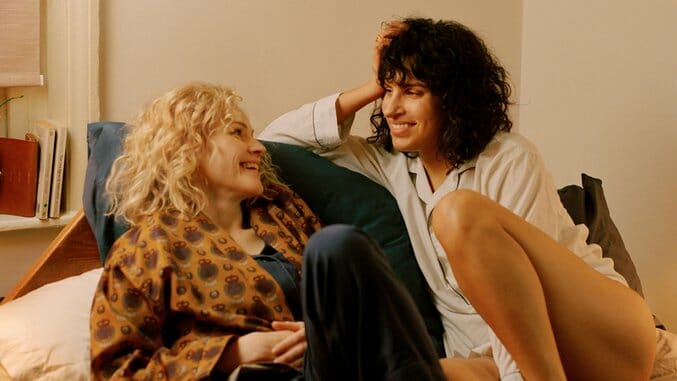It’s Time to Reconsider Hulu’s Underappreciated The Bisexual
The Bisexual’s fixation on inbetweenness doesn’t make the story itself of middling quality.
Photos Courtesy of Hulu
When queerness appears in the mainstream, the stories often fit a certain silhouette. The teenage coming-out journey remains popular, while grittier renditions focus on the brutalities that can accompany LGBTQIA membership—the family rejection, homelessness, drug and alcohol abuse. Primed with these narrative cliches, audiences begin to expect two types of endings for queer tales: uplifting stories of acceptance and utterly bleak finalities of loss. But this binary only speaks to the ends of the spectrum.
Desiree Akhavan’s The Bisexual (streaming in the U.S. on Hulu) responds to this problem by pushing back on the types of binaries embedded within queer media, including the limitations of story arcs and the types of queerness represented. As the title explicitly states, Akhavan isn’t interested in replicating either story. Instead, her series emerges as a counterargument to its genre. What if we upended the normative answers to the who, what, when, why, and where for a queer story? Could the audience still love the title character?
From the initial critical reception, when Akhavan threw this gauntlet down, few were able to accept this challenge—or grant that grace to the main character. The Guardian called the show “neither comic nor dramatic” and “a bleak, affectless and suffocatingly joyless affair.” The Hollywood Reporter wasn’t far behind, claiming the plot “is mired in gluey, gummy pathos.” While both critics admitted that the show possessed wit, its witticisms were largely leveraged against it, the charge being that the show took itself too seriously on poor grounds. The reviews echo with a scoff: “It’s 2018, bisexuality—get over yourself!”
Perhaps, in 2020, it’s time for a reconsideration. As Akhavan mentions in her own press, The Bisexual was created from the dramatic lack of existing representation, rather than a glut of it. In Akhavan’s own words: “I’ve just never seen any representation, outside of Tila Tequila, who had a reality show called A Shot at Love.” However, The Bisexual doesn’t deserve plaudits for checking a box of marginalized experience. The show seeks out in an uncomfortability similar way to how a tongue compulsively pokes at a mouth wound: ill-advisedly but uncontrollably. The way Akhavan luxurates in the awkward, unknown, and alienation within the screenplay makes The Bisexual worthy of kudos, even if your skin crawls.
-

-

-

-

-

-

-

-

-

-

-

-

-

-

-

-

-

-

-

-

-

-

-

-

-

-

-

-

-

-

-

-

-

-

-

-

-

-

-

-








































